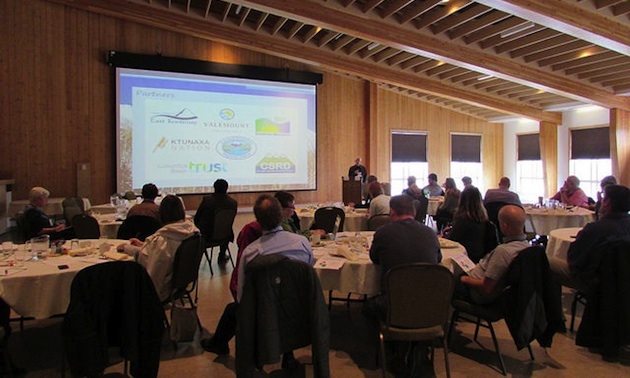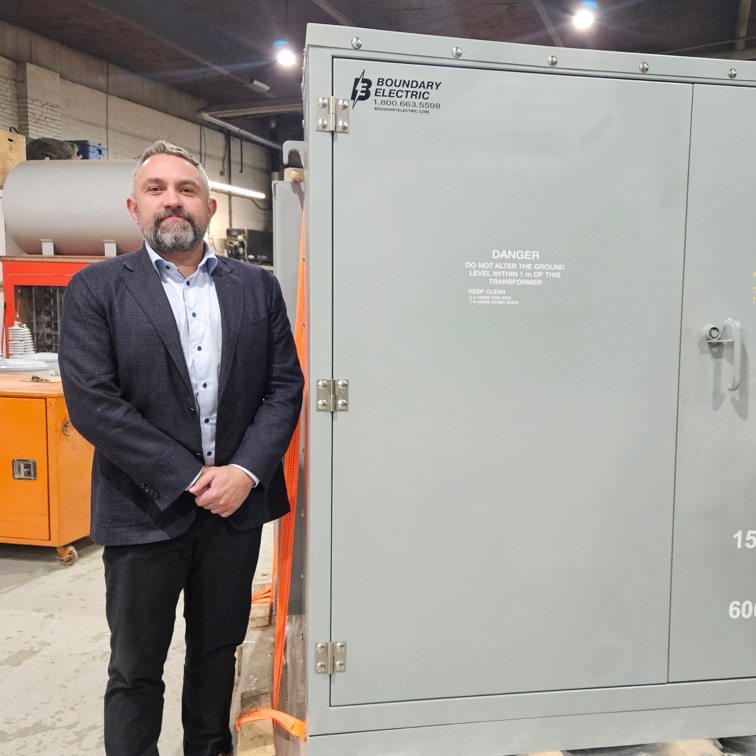When will everyone in the Kootenays have access to high-speed Internet?
Why region-wide broadband matters to businesses, even when they already have it.

Rob Gay, chair of the Kootenay Boundary Regional Broadband Committee, leads a discussion about the availability of high-speed internet in the Elk Valley and throughout the Kootenays. — Kerry Shellborn photo
Would you purchase a home or business that didn’t have power or water? What about high-speed Internet? That question was front and centre at the Elk Valley Broadband Forum held at the Elkford Community Conference Centre on October 15, 2014.
“Fibre has become the fourth essential service, along with power, water and sewer,” said forum facilitator Diana Brooks from B.C.’s Ministry of Jobs, Tourism and Skills Training.
While looking around the room, I couldn’t help but notice that almost everyone at the conference had a computer, tablet or cell phone (some had all three). When the Internet goes down, business can grind to a halt.
It’s true that most businesses in the Kootenays have access to the Internet. That was the case for the municipalities of Fernie, Sparwood and Elkford, who were all in attendance at the forum. But once you leave the city centres, that no longer applies. Industrial parks, new developments and residences on the outskirts of the towns may not have high-speed Internet access.
Why access to rural areas matters
When you look to the rural areas, that becomes even more of an issue.
“My guess would be about 30 per cent of rural residents do not have access,” said Rob Gay, chair of the Kootenay Boundary Regional Broadband Committee, “some because they don’t see a need, and others because it is not available at a reasonable cost.”
Lack of access to the Internet can make it difficult for businesses to attract and retain skilled employees who want to be connected. As healthcare and education services move online, it becomes imperative for Canadians to have high-speed access.
Internet service providers can help
The federal government recently announced the next steps in its plan to bring high-speed Internet to an additional 280,000 homes. It is calling on local Internet service providers (ISPs) to apply for funding to extend or enhance service to areas in need. According to Gay, there is lots of need in the Kootenays. There is also help for local ISPs that see an opportunity.
What can rural communities do if they would like to have high-speed internet?
“The impact of the federal government’s new program could really help do two things," said Gay, "improve service to higher speed of five megabytes, and also bring service to those who don’t have affordable service. The private and not-for-profit sector has the greatest role in moving the region forward, as only Internet service providers can make application for the funding. To be successful, they must submit high-quality proposals that indicate what technology they will use, how and who they will serve, and if the business is sustainable. Our regional broadband committee will work with ISPs should they wish the help.”
One of the key take-aways from the broadband forum is the need for collaboration. Getting high-speed Internet is expensive, especially for low population areas. Very few businesses or individuals can afford to bring broadband on their own. Some areas are well served by the larger telecommunication companies like Telus and Shaw. But when they don’t see the value in bringing in high-speed service, there are options.
Who can help?
The following organizations are available to provide assistance to communities and businesses who are interested in getting high-speed Internet:
Regional District of East Kootenay
The Kootenay Boundary Regional Broadband is an RDEK committee with a mission of providing “equitable, affordable high-speed broadband and Internet services throughout the region, ensuring rural economic development and sustainable, healthy communities.”
Contact: Rob C. Gay, Committee Chair, Regional Broadband Committee
Columbia Basin Broadband Corporation
CBBC is a wholly owned subsidiary of Columbia Basin Trust and has a regional fibre optic network that connects a broad area of the basin, from Rossland to Canal Flats and east to the Elk Valley. It has worked with communities like Trail, Nelson and Kaslo to bring both wired and wireless Internet solutions to those communities.
Contact: Aimee Ambrosone, chief operating officer, Columbia Basin Broadband Corporation
Elk Valley Economic Initiative
EVEI was a co-host of the Elk Valley Broadband Forum. The broad objective of this organization is to foster close working relationships between Elk Valley communities, with a common focus on economic development.
Contact: Jude Smith, Business Development Liaison, Sparwood





Comments